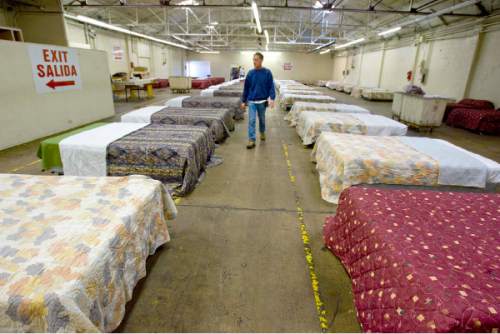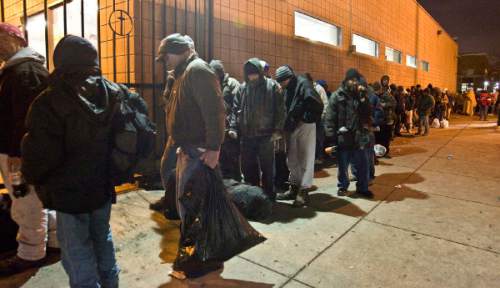This is an archived article that was published on sltrib.com in 2015, and information in the article may be outdated. It is provided only for personal research purposes and may not be reprinted.
The Pioneer Park Coalition, led by business interests seeking to bring new life to the Rio Grande neighborhood, is taking flak from some service providers and government agencies who see it as barging ahead without buy-in from members.
The Road Home shelter is officially out of the Pioneer Park Coalition — the second homeless-service provider to leave — after top coalition leaders' presentation earlier this month seeking funding from the state Legislature for a housing project on west North Temple.
Matt Minkevitch, executive director of The Road Home, said his organization left the coalition because it cannot sign on to such initiatives without the approval of its board of directors. He added, however, that The Road Home will continue to work with the coalition.
In their Feb. 11 presentation to the Legislature, coalition executives Scott Howell, Bryson Garbett, Josh Romney and Jonathan Harmon listed 85 group members — including The Road Home — as supporting the request for $1 million in state funds to build housing units on Salt Lake City's west side.
"We wanted to make sure we were not implying consent for various programs without the consent of our board," Minkevitch said. "But we consider ourselves a friend of the coalition."
Last week, the executive director of the Crossroads Urban Center, Glenn Bailey, resigned from the coalition because, he said, it listed his organization as one of the supporters of the housing proposal on the west side. Bailey said he hadn't seen the plan and would never have supported the proposed sites. He complained the coalition was operating in a top-down fashion that left most members out of decision making and suggested it had an unspoken agenda of moving homeless services out of the Rio Grande area.
The permanent supportive housing project proposed by the coalition is not an emergency shelter, but would be an apartment complex aimed at providing affordable homes for the homeless.
The Pioneer Park Coalition was launched about a year ago by business interests in the Rio Grande district surrounding the park. It invited all interested private and public entities to join. Howell said the coalition has more than 200 members. Its stated goal is to improve the neighborhood for residents, businesses and the homeless population.
Among its ambitions is to provide housing and evaluate homeless services, including the locations of The Road Home shelter and St. Vincent de Paul soup kitchen. Since then, however, Mayor Ralph Becker created his own commission to evaluate service providers and their locations. Several members on the Pioneer Park Coalition serve on the mayor's commission.
More recently, the mayor and City Councilman James Rogers issued a news release stating they did not favor a west-side location for the housing project as proposed by the coalition because it had not been vetted by city planners, the Planning Commission or the City Council.
Howell, however, said the two west-side parcels listed on the legislative appropriations proposal were not the only sites under consideration. He added that the coalition had overwhelming support from its members to seek state funding from the Legislature.
If the project is funded, Howell said, the money would go through the Olene Walker Housing Loan Fund that would guarantee the housing site had community support.
Volunteers of America will remain with the coalition, said the group's president and CEO, Kathy Bray. But she is troubled the coalition's executive committee did not inform her of the specifics of its funding request, including the proposed west-side location of the housing project.
"There were efforts for raising money for permanent supportive housing. I support that because that's part of the solution [to homelessness]," she said. "But we weren't happy that we didn't know about a document that had our name on it."
Matt Caputo, CEO of Caputo's Market and Deli, said he has attended one Pioneer Park Coalition meeting but wasn't sure if he was a member. Nonetheless, he did not mind that the coalition used his company's name because he supports its efforts to improve the area.
"I hope we can figure it out and move forward," he said of the challenges facing the Rio Grande neighborhood. "The coalition could probably count us as a member."
On the other hand, City Councilman Stan Penfold, who also sits as chairman of the city's Redevelopment Agency Board, said the RDA is not a member of the coalition — despite the coalition's legislative proposal that includes its name. The agency has made no decisions or recommendations for such a housing project.
Penfold added, however, that RDA officials have attended coalition meetings.
"I'm completely unaware of their membership structure," he said. "And we were unaware of their proposal to the Legislature."
The Utah Department of Workforce Services, too, was unaware of the coalition's legislative proposal, said spokesman Nic Dunn, although it does consider the coalition a "partner" in seeking solutions to homelessness. The agency also was listed as supporting the proposal.
"We don't have people regularly attend those meetings," Dunn said. "As far as a specific project, we don't have an official position."
Nonetheless, Howell said he was not deterred by the confusion.
The coalition will continue to move forward, he said, and seek community support to better serve the homeless population and improve the Pioneer Park area for residents and businesses.





